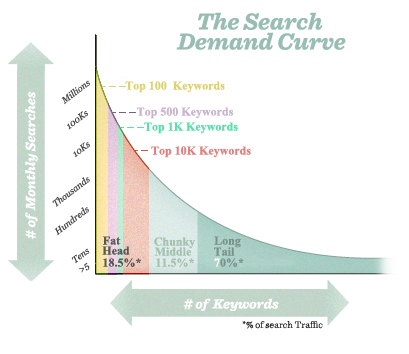Business.
The internet only became fully commercialized in 1995, but online advertising had already been brought to life in the early stages of the dot-com boom.
It is now almost expected for a company, even a small one, to have a website to show where they are at the very least. And with the numbers of towns, cities; companies opening and closing down all the time, there is going to be a LOT of competition.
Search Engine Optimization
The science of putting yourself where people are looking on Google. For multinational corporations that will mean the top three results on a keyword that has thousands or more searches a day. For smaller companies, the first page of something specific and relevant to their area of expertise will do nicely.
Most companies will want searches connecting from keywords in the “Chunky Middle” and “Long Tail” for two simple reasons. First, those sections will become more and more specific as the user gets a better idea of what they want, and smaller companies normally provide one thorough service instead of several split across different areas of trade. And second, there is a lot less competition involved.
The Tools You’ll Need…
- A keyword analyser, Google AdWords being a free, and user-friendly example
- Accurate page titles, and URL’s that match them to make your site easy to track and show the user exactly what they’re getting
…And What You’ll Do With Them
On your keyword analyser you should search for keywords that feature in your page titles or your websites name, or things that match those or what you do closely. Remember, your looking for specific and relevant. Most analysers will show you how many searches a keywords receives over a period of time, and how tough the competition for it is. And the same for several similar keywords that the analyser picks out.
Ideally, you want the keywords you choose to be low competition for relatively high search rates. More usually, choose the ones closest matching that have the best number of searches for low, or if you’re growing lots then medium competition. Bring out a selection you think work best and then liberally sprinkle over page titles, page URLs and meta description. Don’t try to use any keyword that looks promising, even if it is completely different to what you are offering. This is called “cloaking” and when discovered, which it will be if you want search engines to find you, it incurs harsh penalties.
It is pretty simple to do at it’s heart, but to do right, this needs time and consideration. Keep in mind to build sites for users, not for search engines. Search engines get the business by delivering users to sites that fulfill their needs, so they will rank you up for a high performance, trustworthy site.
You can also pay Google for an advertised slot, and this will most likely increase click’s into your site, but organic (read: earned) results are much more trusted, as demonstrated below.
If You Have A Lead, Keep It


